International Hospitality Management: Background, SWOT Analysis, Emerging Markets, Strategic Models and Framework
VerifiedAdded on 2022/11/28
|16
|4421
|360
AI Summary
This report provides an overview of international hospitality management, including background on the industry, SWOT analysis of Intercontinental Hotels Group, analysis of emerging markets, and strategic models and frameworks. It also discusses the application of these strategies and concludes with references.
Contribute Materials
Your contribution can guide someone’s learning journey. Share your
documents today.
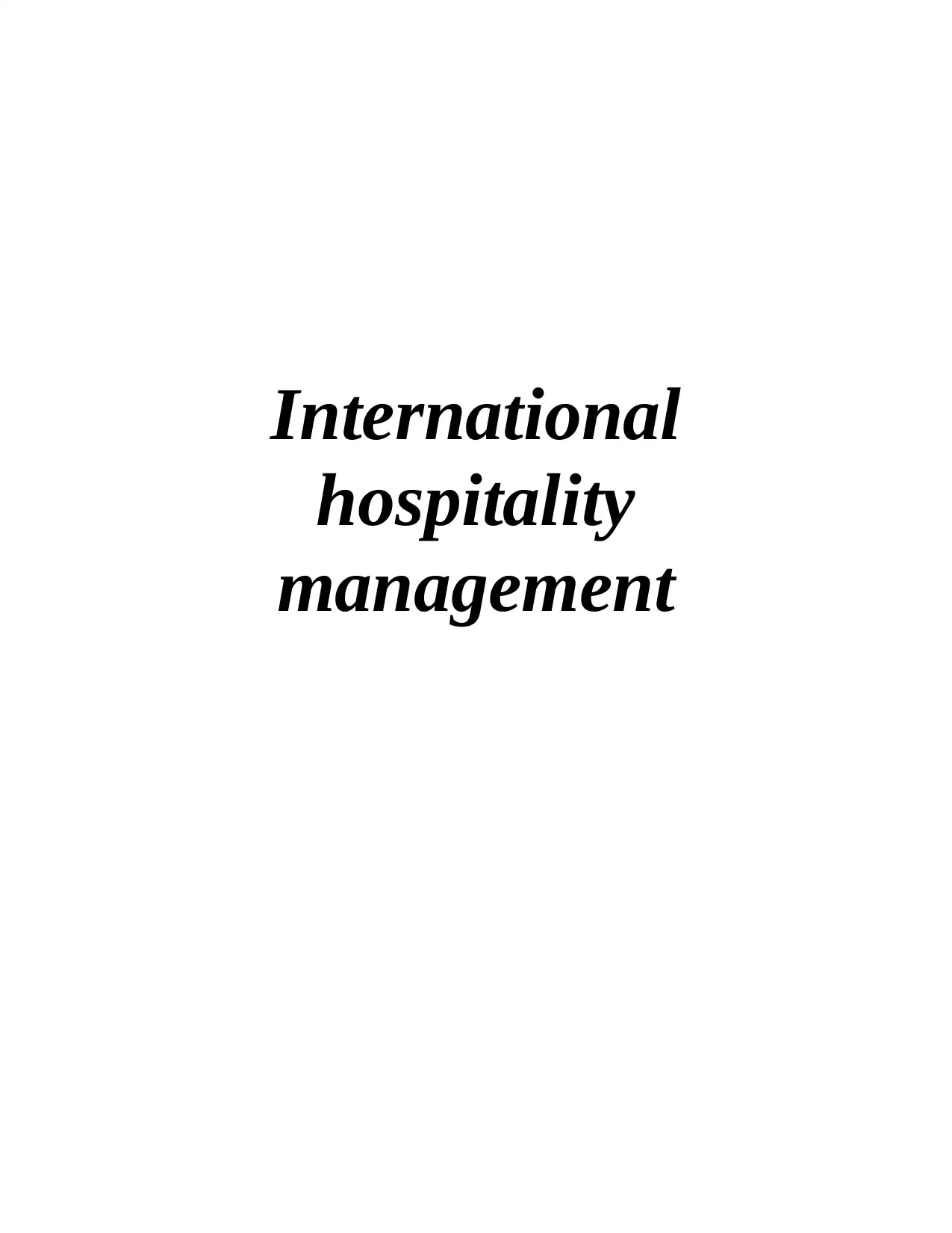
International
hospitality
management
hospitality
management
Secure Best Marks with AI Grader
Need help grading? Try our AI Grader for instant feedback on your assignments.
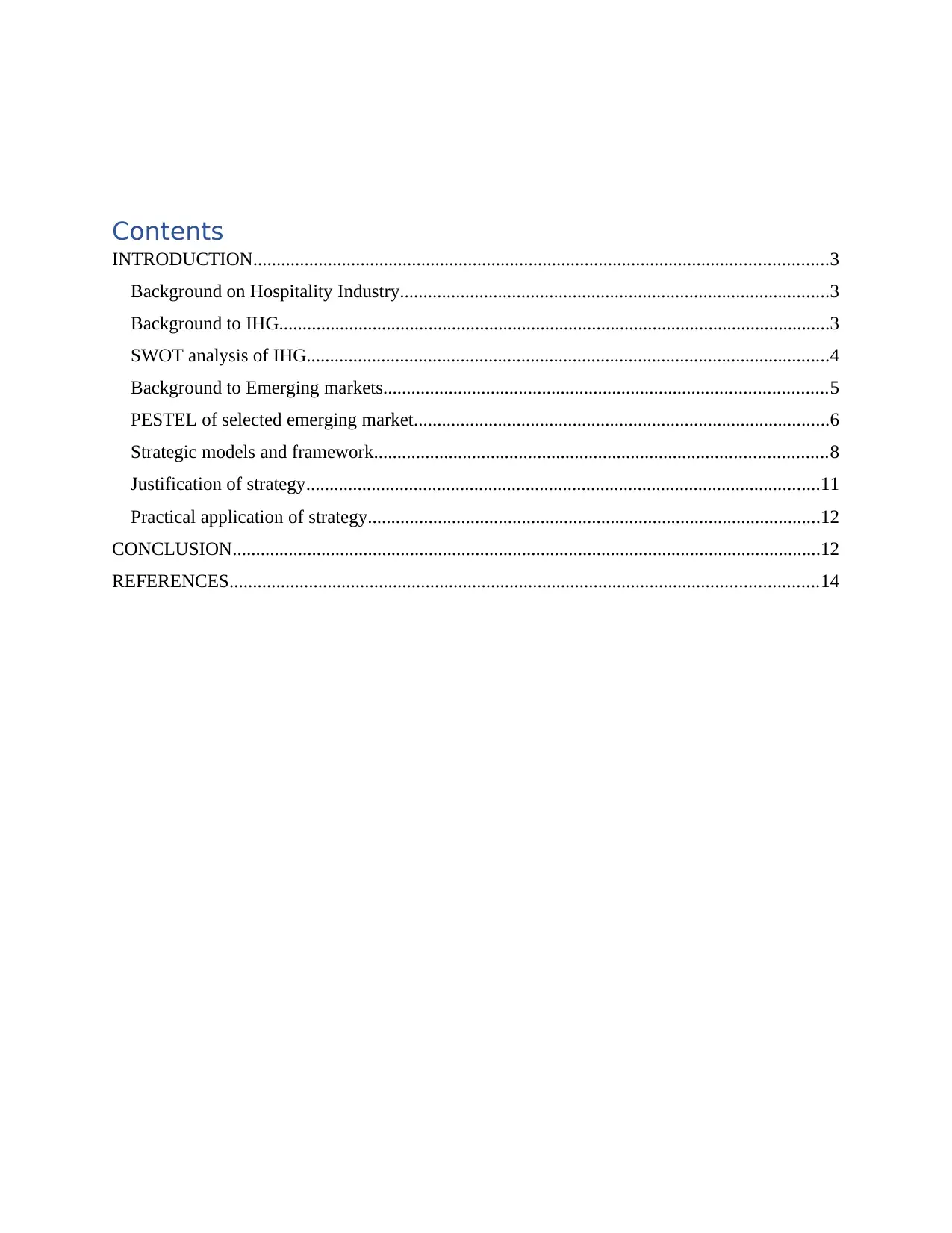
Contents
INTRODUCTION...........................................................................................................................3
Background on Hospitality Industry............................................................................................3
Background to IHG......................................................................................................................3
SWOT analysis of IHG................................................................................................................4
Background to Emerging markets...............................................................................................5
PESTEL of selected emerging market.........................................................................................6
Strategic models and framework.................................................................................................8
Justification of strategy..............................................................................................................11
Practical application of strategy.................................................................................................12
CONCLUSION..............................................................................................................................12
REFERENCES..............................................................................................................................14
INTRODUCTION...........................................................................................................................3
Background on Hospitality Industry............................................................................................3
Background to IHG......................................................................................................................3
SWOT analysis of IHG................................................................................................................4
Background to Emerging markets...............................................................................................5
PESTEL of selected emerging market.........................................................................................6
Strategic models and framework.................................................................................................8
Justification of strategy..............................................................................................................11
Practical application of strategy.................................................................................................12
CONCLUSION..............................................................................................................................12
REFERENCES..............................................................................................................................14
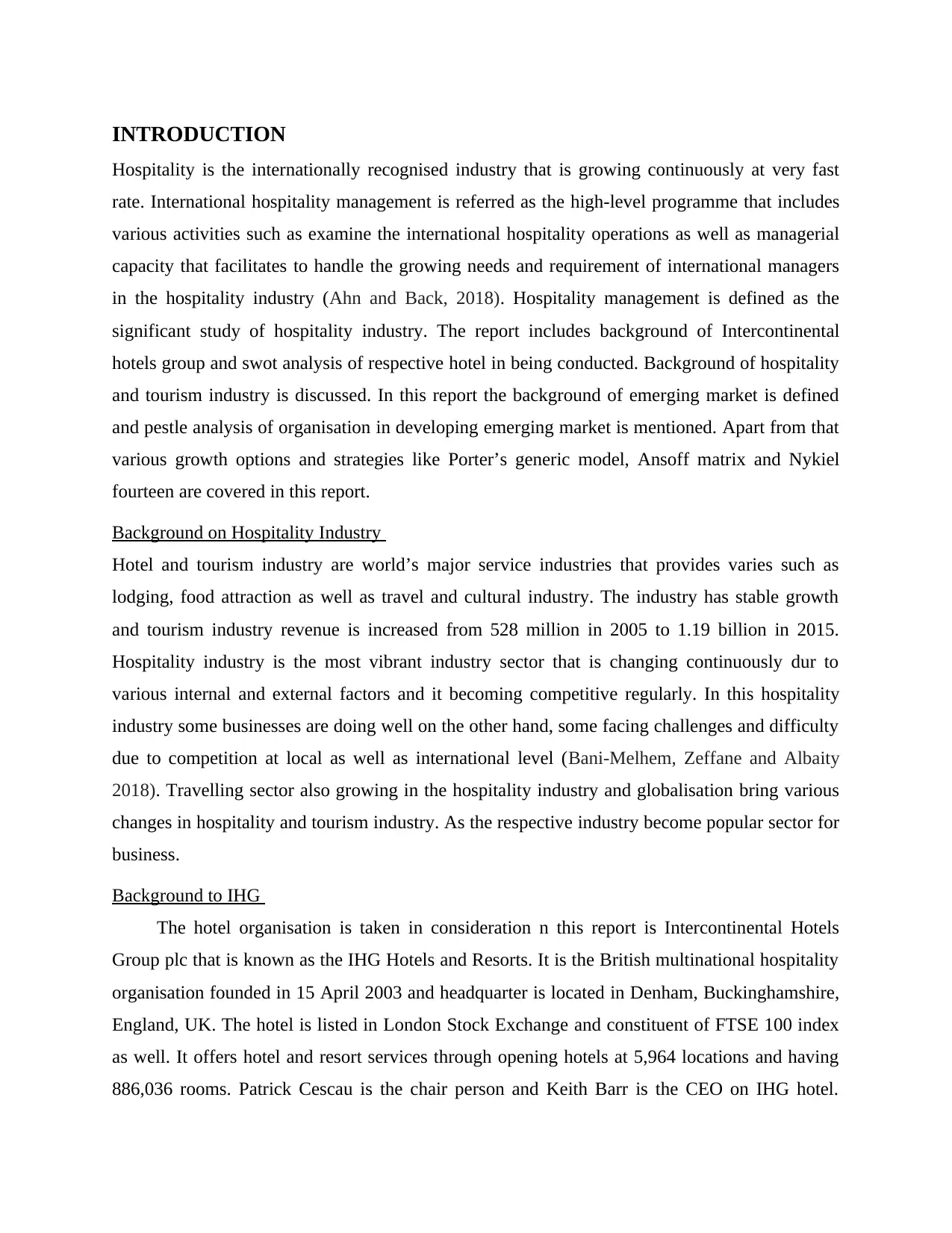
INTRODUCTION
Hospitality is the internationally recognised industry that is growing continuously at very fast
rate. International hospitality management is referred as the high-level programme that includes
various activities such as examine the international hospitality operations as well as managerial
capacity that facilitates to handle the growing needs and requirement of international managers
in the hospitality industry (Ahn and Back, 2018). Hospitality management is defined as the
significant study of hospitality industry. The report includes background of Intercontinental
hotels group and swot analysis of respective hotel in being conducted. Background of hospitality
and tourism industry is discussed. In this report the background of emerging market is defined
and pestle analysis of organisation in developing emerging market is mentioned. Apart from that
various growth options and strategies like Porter’s generic model, Ansoff matrix and Nykiel
fourteen are covered in this report.
Background on Hospitality Industry
Hotel and tourism industry are world’s major service industries that provides varies such as
lodging, food attraction as well as travel and cultural industry. The industry has stable growth
and tourism industry revenue is increased from 528 million in 2005 to 1.19 billion in 2015.
Hospitality industry is the most vibrant industry sector that is changing continuously dur to
various internal and external factors and it becoming competitive regularly. In this hospitality
industry some businesses are doing well on the other hand, some facing challenges and difficulty
due to competition at local as well as international level (Bani-Melhem, Zeffane and Albaity
2018). Travelling sector also growing in the hospitality industry and globalisation bring various
changes in hospitality and tourism industry. As the respective industry become popular sector for
business.
Background to IHG
The hotel organisation is taken in consideration n this report is Intercontinental Hotels
Group plc that is known as the IHG Hotels and Resorts. It is the British multinational hospitality
organisation founded in 15 April 2003 and headquarter is located in Denham, Buckinghamshire,
England, UK. The hotel is listed in London Stock Exchange and constituent of FTSE 100 index
as well. It offers hotel and resort services through opening hotels at 5,964 locations and having
886,036 rooms. Patrick Cescau is the chair person and Keith Barr is the CEO on IHG hotel.
Hospitality is the internationally recognised industry that is growing continuously at very fast
rate. International hospitality management is referred as the high-level programme that includes
various activities such as examine the international hospitality operations as well as managerial
capacity that facilitates to handle the growing needs and requirement of international managers
in the hospitality industry (Ahn and Back, 2018). Hospitality management is defined as the
significant study of hospitality industry. The report includes background of Intercontinental
hotels group and swot analysis of respective hotel in being conducted. Background of hospitality
and tourism industry is discussed. In this report the background of emerging market is defined
and pestle analysis of organisation in developing emerging market is mentioned. Apart from that
various growth options and strategies like Porter’s generic model, Ansoff matrix and Nykiel
fourteen are covered in this report.
Background on Hospitality Industry
Hotel and tourism industry are world’s major service industries that provides varies such as
lodging, food attraction as well as travel and cultural industry. The industry has stable growth
and tourism industry revenue is increased from 528 million in 2005 to 1.19 billion in 2015.
Hospitality industry is the most vibrant industry sector that is changing continuously dur to
various internal and external factors and it becoming competitive regularly. In this hospitality
industry some businesses are doing well on the other hand, some facing challenges and difficulty
due to competition at local as well as international level (Bani-Melhem, Zeffane and Albaity
2018). Travelling sector also growing in the hospitality industry and globalisation bring various
changes in hospitality and tourism industry. As the respective industry become popular sector for
business.
Background to IHG
The hotel organisation is taken in consideration n this report is Intercontinental Hotels
Group plc that is known as the IHG Hotels and Resorts. It is the British multinational hospitality
organisation founded in 15 April 2003 and headquarter is located in Denham, Buckinghamshire,
England, UK. The hotel is listed in London Stock Exchange and constituent of FTSE 100 index
as well. It offers hotel and resort services through opening hotels at 5,964 locations and having
886,036 rooms. Patrick Cescau is the chair person and Keith Barr is the CEO on IHG hotel.
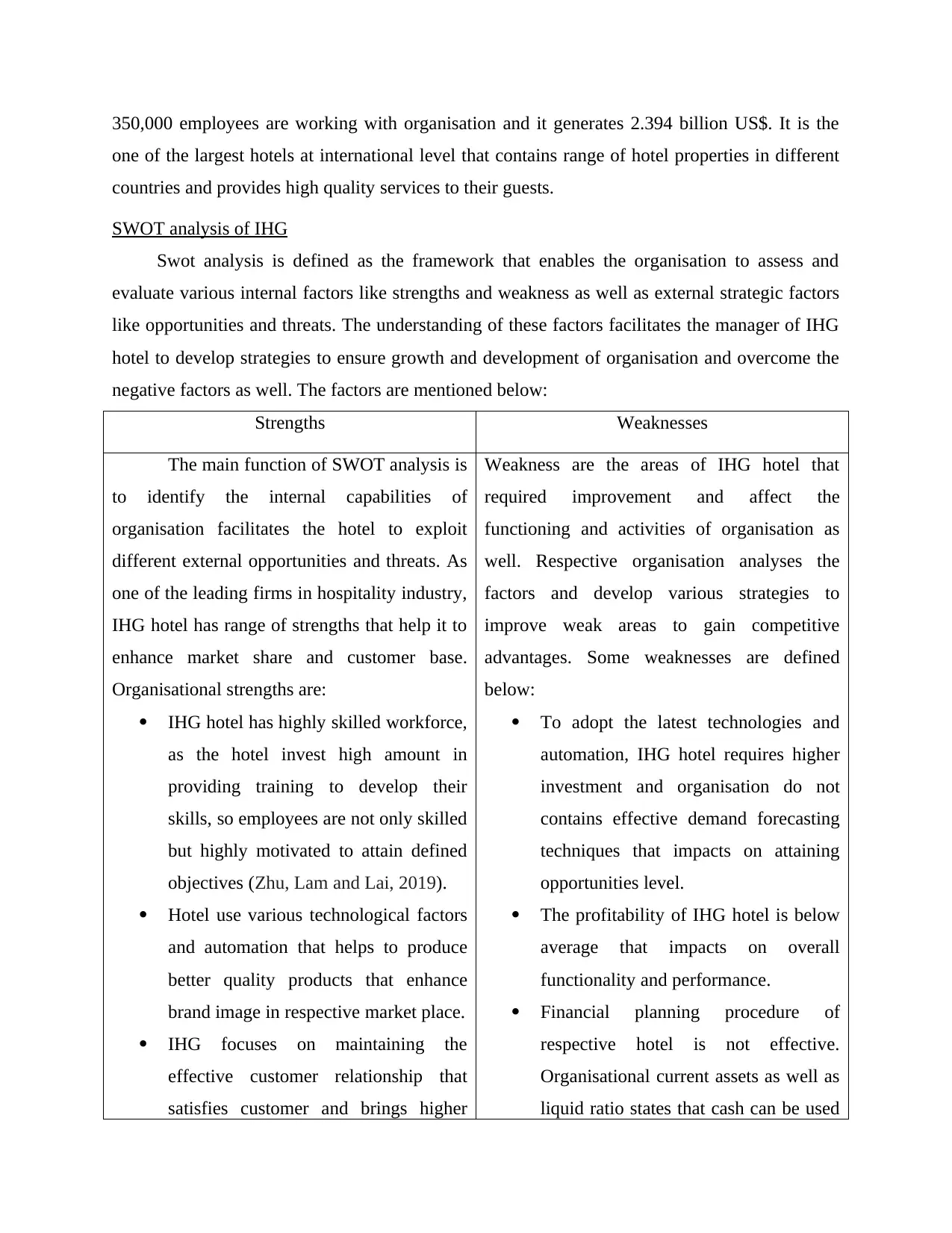
350,000 employees are working with organisation and it generates 2.394 billion US$. It is the
one of the largest hotels at international level that contains range of hotel properties in different
countries and provides high quality services to their guests.
SWOT analysis of IHG
Swot analysis is defined as the framework that enables the organisation to assess and
evaluate various internal factors like strengths and weakness as well as external strategic factors
like opportunities and threats. The understanding of these factors facilitates the manager of IHG
hotel to develop strategies to ensure growth and development of organisation and overcome the
negative factors as well. The factors are mentioned below:
Strengths Weaknesses
The main function of SWOT analysis is
to identify the internal capabilities of
organisation facilitates the hotel to exploit
different external opportunities and threats. As
one of the leading firms in hospitality industry,
IHG hotel has range of strengths that help it to
enhance market share and customer base.
Organisational strengths are:
IHG hotel has highly skilled workforce,
as the hotel invest high amount in
providing training to develop their
skills, so employees are not only skilled
but highly motivated to attain defined
objectives (Zhu, Lam and Lai, 2019).
Hotel use various technological factors
and automation that helps to produce
better quality products that enhance
brand image in respective market place.
IHG focuses on maintaining the
effective customer relationship that
satisfies customer and brings higher
Weakness are the areas of IHG hotel that
required improvement and affect the
functioning and activities of organisation as
well. Respective organisation analyses the
factors and develop various strategies to
improve weak areas to gain competitive
advantages. Some weaknesses are defined
below:
To adopt the latest technologies and
automation, IHG hotel requires higher
investment and organisation do not
contains effective demand forecasting
techniques that impacts on attaining
opportunities level.
The profitability of IHG hotel is below
average that impacts on overall
functionality and performance.
Financial planning procedure of
respective hotel is not effective.
Organisational current assets as well as
liquid ratio states that cash can be used
one of the largest hotels at international level that contains range of hotel properties in different
countries and provides high quality services to their guests.
SWOT analysis of IHG
Swot analysis is defined as the framework that enables the organisation to assess and
evaluate various internal factors like strengths and weakness as well as external strategic factors
like opportunities and threats. The understanding of these factors facilitates the manager of IHG
hotel to develop strategies to ensure growth and development of organisation and overcome the
negative factors as well. The factors are mentioned below:
Strengths Weaknesses
The main function of SWOT analysis is
to identify the internal capabilities of
organisation facilitates the hotel to exploit
different external opportunities and threats. As
one of the leading firms in hospitality industry,
IHG hotel has range of strengths that help it to
enhance market share and customer base.
Organisational strengths are:
IHG hotel has highly skilled workforce,
as the hotel invest high amount in
providing training to develop their
skills, so employees are not only skilled
but highly motivated to attain defined
objectives (Zhu, Lam and Lai, 2019).
Hotel use various technological factors
and automation that helps to produce
better quality products that enhance
brand image in respective market place.
IHG focuses on maintaining the
effective customer relationship that
satisfies customer and brings higher
Weakness are the areas of IHG hotel that
required improvement and affect the
functioning and activities of organisation as
well. Respective organisation analyses the
factors and develop various strategies to
improve weak areas to gain competitive
advantages. Some weaknesses are defined
below:
To adopt the latest technologies and
automation, IHG hotel requires higher
investment and organisation do not
contains effective demand forecasting
techniques that impacts on attaining
opportunities level.
The profitability of IHG hotel is below
average that impacts on overall
functionality and performance.
Financial planning procedure of
respective hotel is not effective.
Organisational current assets as well as
liquid ratio states that cash can be used
Secure Best Marks with AI Grader
Need help grading? Try our AI Grader for instant feedback on your assignments.
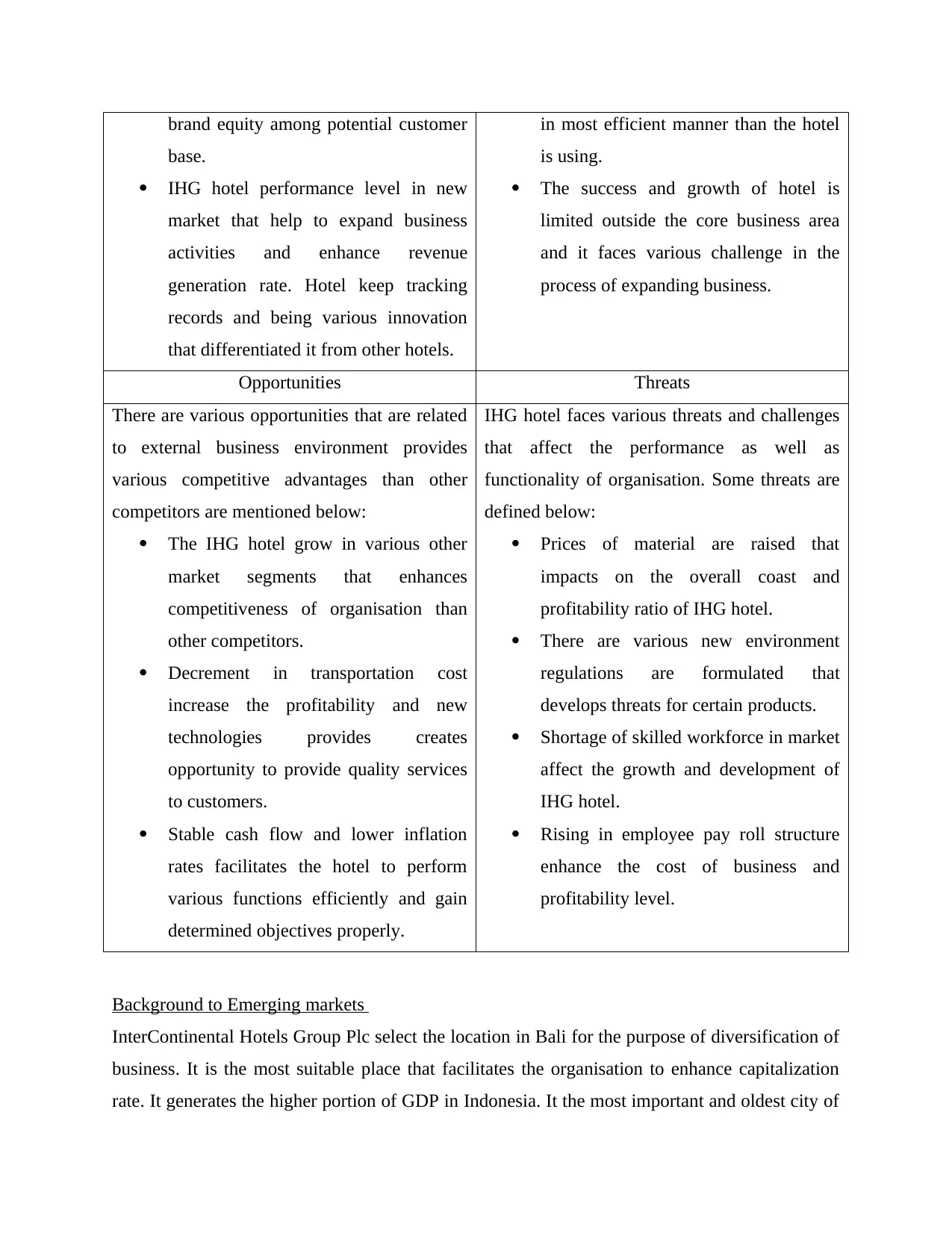
brand equity among potential customer
base.
IHG hotel performance level in new
market that help to expand business
activities and enhance revenue
generation rate. Hotel keep tracking
records and being various innovation
that differentiated it from other hotels.
in most efficient manner than the hotel
is using.
The success and growth of hotel is
limited outside the core business area
and it faces various challenge in the
process of expanding business.
Opportunities Threats
There are various opportunities that are related
to external business environment provides
various competitive advantages than other
competitors are mentioned below:
The IHG hotel grow in various other
market segments that enhances
competitiveness of organisation than
other competitors.
Decrement in transportation cost
increase the profitability and new
technologies provides creates
opportunity to provide quality services
to customers.
Stable cash flow and lower inflation
rates facilitates the hotel to perform
various functions efficiently and gain
determined objectives properly.
IHG hotel faces various threats and challenges
that affect the performance as well as
functionality of organisation. Some threats are
defined below:
Prices of material are raised that
impacts on the overall coast and
profitability ratio of IHG hotel.
There are various new environment
regulations are formulated that
develops threats for certain products.
Shortage of skilled workforce in market
affect the growth and development of
IHG hotel.
Rising in employee pay roll structure
enhance the cost of business and
profitability level.
Background to Emerging markets
InterContinental Hotels Group Plc select the location in Bali for the purpose of diversification of
business. It is the most suitable place that facilitates the organisation to enhance capitalization
rate. It generates the higher portion of GDP in Indonesia. It the most important and oldest city of
base.
IHG hotel performance level in new
market that help to expand business
activities and enhance revenue
generation rate. Hotel keep tracking
records and being various innovation
that differentiated it from other hotels.
in most efficient manner than the hotel
is using.
The success and growth of hotel is
limited outside the core business area
and it faces various challenge in the
process of expanding business.
Opportunities Threats
There are various opportunities that are related
to external business environment provides
various competitive advantages than other
competitors are mentioned below:
The IHG hotel grow in various other
market segments that enhances
competitiveness of organisation than
other competitors.
Decrement in transportation cost
increase the profitability and new
technologies provides creates
opportunity to provide quality services
to customers.
Stable cash flow and lower inflation
rates facilitates the hotel to perform
various functions efficiently and gain
determined objectives properly.
IHG hotel faces various threats and challenges
that affect the performance as well as
functionality of organisation. Some threats are
defined below:
Prices of material are raised that
impacts on the overall coast and
profitability ratio of IHG hotel.
There are various new environment
regulations are formulated that
develops threats for certain products.
Shortage of skilled workforce in market
affect the growth and development of
IHG hotel.
Rising in employee pay roll structure
enhance the cost of business and
profitability level.
Background to Emerging markets
InterContinental Hotels Group Plc select the location in Bali for the purpose of diversification of
business. It is the most suitable place that facilitates the organisation to enhance capitalization
rate. It generates the higher portion of GDP in Indonesia. It the most important and oldest city of
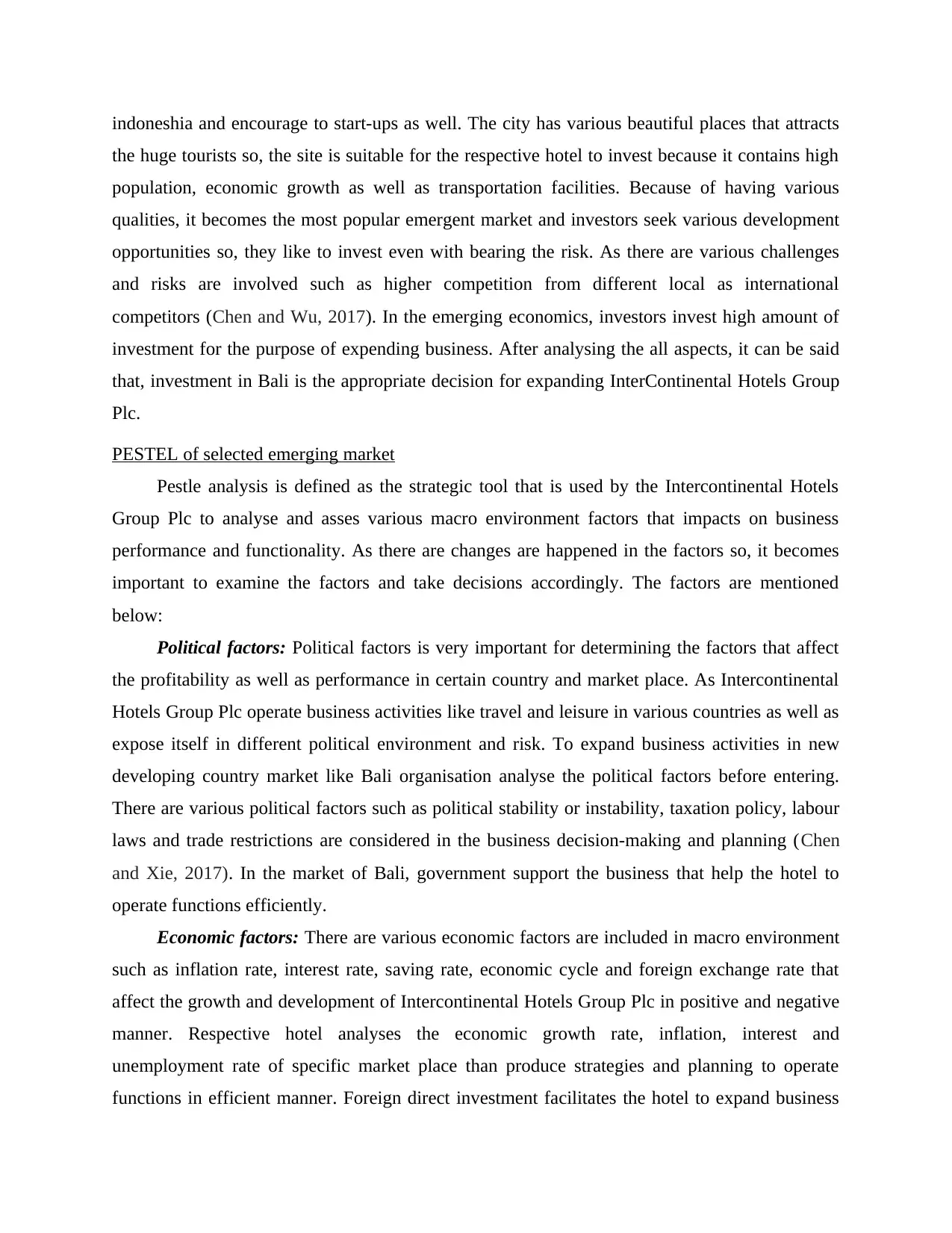
indoneshia and encourage to start-ups as well. The city has various beautiful places that attracts
the huge tourists so, the site is suitable for the respective hotel to invest because it contains high
population, economic growth as well as transportation facilities. Because of having various
qualities, it becomes the most popular emergent market and investors seek various development
opportunities so, they like to invest even with bearing the risk. As there are various challenges
and risks are involved such as higher competition from different local as international
competitors (Chen and Wu, 2017). In the emerging economics, investors invest high amount of
investment for the purpose of expending business. After analysing the all aspects, it can be said
that, investment in Bali is the appropriate decision for expanding InterContinental Hotels Group
Plc.
PESTEL of selected emerging market
Pestle analysis is defined as the strategic tool that is used by the Intercontinental Hotels
Group Plc to analyse and asses various macro environment factors that impacts on business
performance and functionality. As there are changes are happened in the factors so, it becomes
important to examine the factors and take decisions accordingly. The factors are mentioned
below:
Political factors: Political factors is very important for determining the factors that affect
the profitability as well as performance in certain country and market place. As Intercontinental
Hotels Group Plc operate business activities like travel and leisure in various countries as well as
expose itself in different political environment and risk. To expand business activities in new
developing country market like Bali organisation analyse the political factors before entering.
There are various political factors such as political stability or instability, taxation policy, labour
laws and trade restrictions are considered in the business decision-making and planning (Chen
and Xie, 2017). In the market of Bali, government support the business that help the hotel to
operate functions efficiently.
Economic factors: There are various economic factors are included in macro environment
such as inflation rate, interest rate, saving rate, economic cycle and foreign exchange rate that
affect the growth and development of Intercontinental Hotels Group Plc in positive and negative
manner. Respective hotel analyses the economic growth rate, inflation, interest and
unemployment rate of specific market place than produce strategies and planning to operate
functions in efficient manner. Foreign direct investment facilitates the hotel to expand business
the huge tourists so, the site is suitable for the respective hotel to invest because it contains high
population, economic growth as well as transportation facilities. Because of having various
qualities, it becomes the most popular emergent market and investors seek various development
opportunities so, they like to invest even with bearing the risk. As there are various challenges
and risks are involved such as higher competition from different local as international
competitors (Chen and Wu, 2017). In the emerging economics, investors invest high amount of
investment for the purpose of expending business. After analysing the all aspects, it can be said
that, investment in Bali is the appropriate decision for expanding InterContinental Hotels Group
Plc.
PESTEL of selected emerging market
Pestle analysis is defined as the strategic tool that is used by the Intercontinental Hotels
Group Plc to analyse and asses various macro environment factors that impacts on business
performance and functionality. As there are changes are happened in the factors so, it becomes
important to examine the factors and take decisions accordingly. The factors are mentioned
below:
Political factors: Political factors is very important for determining the factors that affect
the profitability as well as performance in certain country and market place. As Intercontinental
Hotels Group Plc operate business activities like travel and leisure in various countries as well as
expose itself in different political environment and risk. To expand business activities in new
developing country market like Bali organisation analyse the political factors before entering.
There are various political factors such as political stability or instability, taxation policy, labour
laws and trade restrictions are considered in the business decision-making and planning (Chen
and Xie, 2017). In the market of Bali, government support the business that help the hotel to
operate functions efficiently.
Economic factors: There are various economic factors are included in macro environment
such as inflation rate, interest rate, saving rate, economic cycle and foreign exchange rate that
affect the growth and development of Intercontinental Hotels Group Plc in positive and negative
manner. Respective hotel analyses the economic growth rate, inflation, interest and
unemployment rate of specific market place than produce strategies and planning to operate
functions in efficient manner. Foreign direct investment facilitates the hotel to expand business
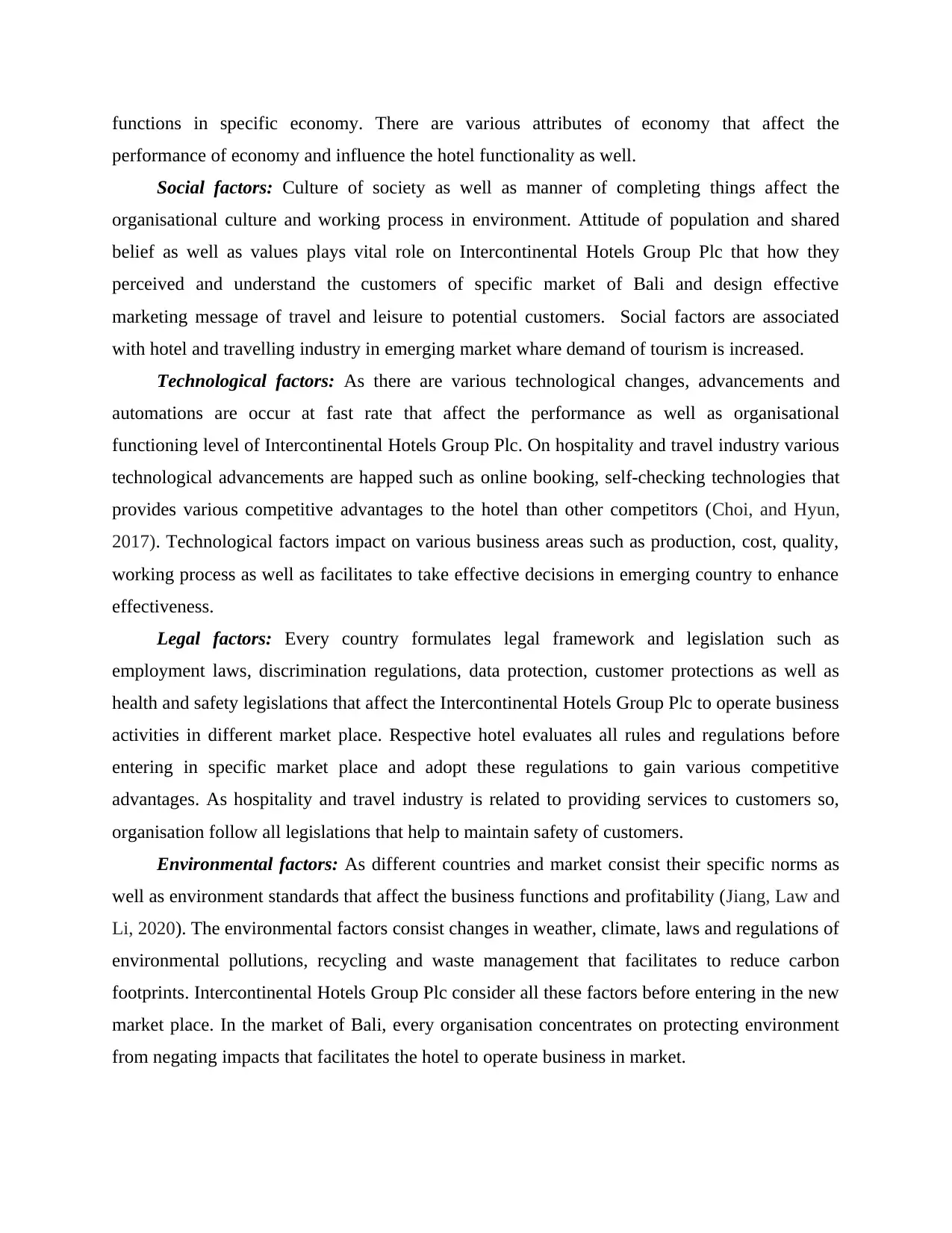
functions in specific economy. There are various attributes of economy that affect the
performance of economy and influence the hotel functionality as well.
Social factors: Culture of society as well as manner of completing things affect the
organisational culture and working process in environment. Attitude of population and shared
belief as well as values plays vital role on Intercontinental Hotels Group Plc that how they
perceived and understand the customers of specific market of Bali and design effective
marketing message of travel and leisure to potential customers. Social factors are associated
with hotel and travelling industry in emerging market whare demand of tourism is increased.
Technological factors: As there are various technological changes, advancements and
automations are occur at fast rate that affect the performance as well as organisational
functioning level of Intercontinental Hotels Group Plc. On hospitality and travel industry various
technological advancements are happed such as online booking, self-checking technologies that
provides various competitive advantages to the hotel than other competitors (Choi, and Hyun,
2017). Technological factors impact on various business areas such as production, cost, quality,
working process as well as facilitates to take effective decisions in emerging country to enhance
effectiveness.
Legal factors: Every country formulates legal framework and legislation such as
employment laws, discrimination regulations, data protection, customer protections as well as
health and safety legislations that affect the Intercontinental Hotels Group Plc to operate business
activities in different market place. Respective hotel evaluates all rules and regulations before
entering in specific market place and adopt these regulations to gain various competitive
advantages. As hospitality and travel industry is related to providing services to customers so,
organisation follow all legislations that help to maintain safety of customers.
Environmental factors: As different countries and market consist their specific norms as
well as environment standards that affect the business functions and profitability (Jiang, Law and
Li, 2020). The environmental factors consist changes in weather, climate, laws and regulations of
environmental pollutions, recycling and waste management that facilitates to reduce carbon
footprints. Intercontinental Hotels Group Plc consider all these factors before entering in the new
market place. In the market of Bali, every organisation concentrates on protecting environment
from negating impacts that facilitates the hotel to operate business in market.
performance of economy and influence the hotel functionality as well.
Social factors: Culture of society as well as manner of completing things affect the
organisational culture and working process in environment. Attitude of population and shared
belief as well as values plays vital role on Intercontinental Hotels Group Plc that how they
perceived and understand the customers of specific market of Bali and design effective
marketing message of travel and leisure to potential customers. Social factors are associated
with hotel and travelling industry in emerging market whare demand of tourism is increased.
Technological factors: As there are various technological changes, advancements and
automations are occur at fast rate that affect the performance as well as organisational
functioning level of Intercontinental Hotels Group Plc. On hospitality and travel industry various
technological advancements are happed such as online booking, self-checking technologies that
provides various competitive advantages to the hotel than other competitors (Choi, and Hyun,
2017). Technological factors impact on various business areas such as production, cost, quality,
working process as well as facilitates to take effective decisions in emerging country to enhance
effectiveness.
Legal factors: Every country formulates legal framework and legislation such as
employment laws, discrimination regulations, data protection, customer protections as well as
health and safety legislations that affect the Intercontinental Hotels Group Plc to operate business
activities in different market place. Respective hotel evaluates all rules and regulations before
entering in specific market place and adopt these regulations to gain various competitive
advantages. As hospitality and travel industry is related to providing services to customers so,
organisation follow all legislations that help to maintain safety of customers.
Environmental factors: As different countries and market consist their specific norms as
well as environment standards that affect the business functions and profitability (Jiang, Law and
Li, 2020). The environmental factors consist changes in weather, climate, laws and regulations of
environmental pollutions, recycling and waste management that facilitates to reduce carbon
footprints. Intercontinental Hotels Group Plc consider all these factors before entering in the new
market place. In the market of Bali, every organisation concentrates on protecting environment
from negating impacts that facilitates the hotel to operate business in market.
Paraphrase This Document
Need a fresh take? Get an instant paraphrase of this document with our AI Paraphraser
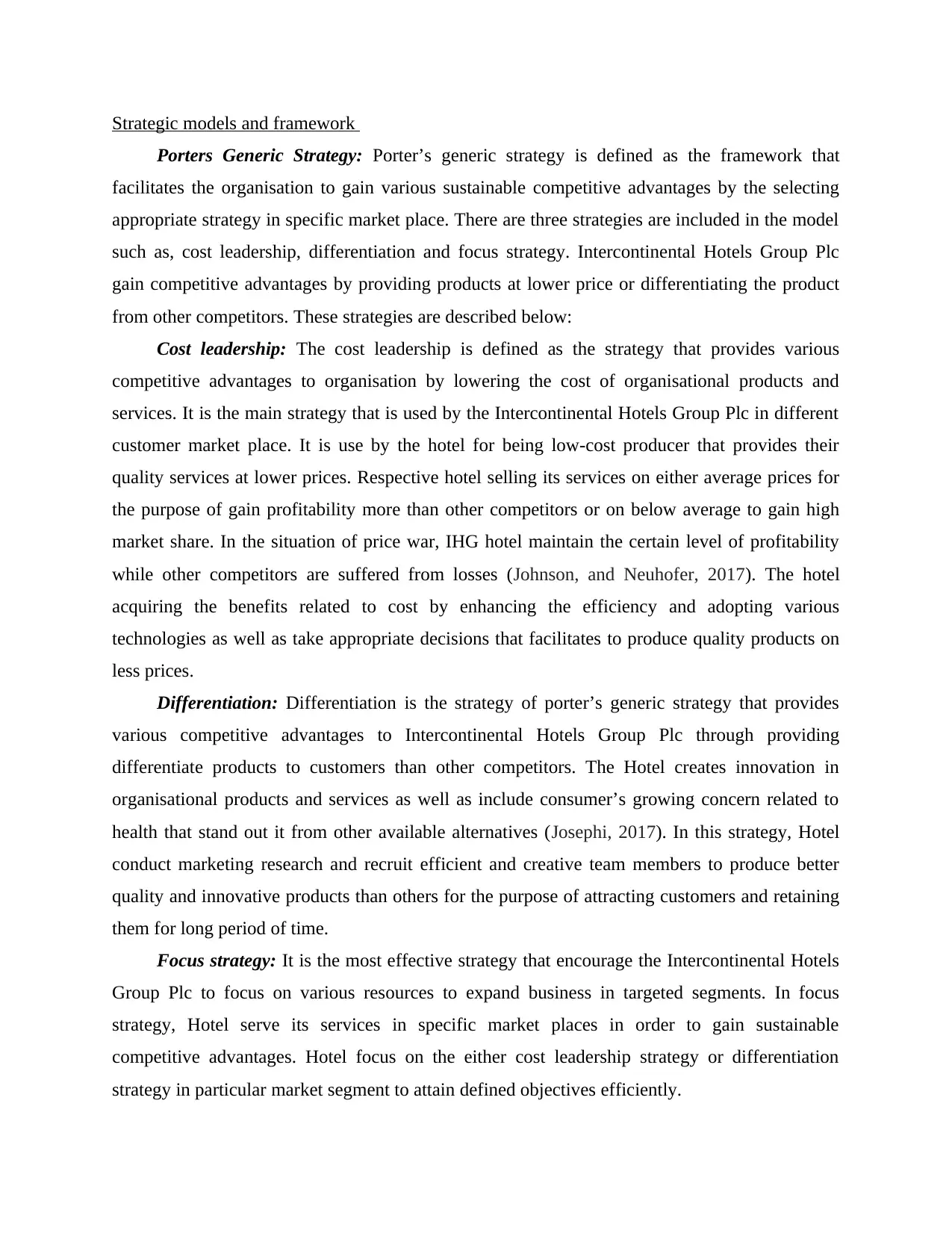
Strategic models and framework
Porters Generic Strategy: Porter’s generic strategy is defined as the framework that
facilitates the organisation to gain various sustainable competitive advantages by the selecting
appropriate strategy in specific market place. There are three strategies are included in the model
such as, cost leadership, differentiation and focus strategy. Intercontinental Hotels Group Plc
gain competitive advantages by providing products at lower price or differentiating the product
from other competitors. These strategies are described below:
Cost leadership: The cost leadership is defined as the strategy that provides various
competitive advantages to organisation by lowering the cost of organisational products and
services. It is the main strategy that is used by the Intercontinental Hotels Group Plc in different
customer market place. It is use by the hotel for being low-cost producer that provides their
quality services at lower prices. Respective hotel selling its services on either average prices for
the purpose of gain profitability more than other competitors or on below average to gain high
market share. In the situation of price war, IHG hotel maintain the certain level of profitability
while other competitors are suffered from losses (Johnson, and Neuhofer, 2017). The hotel
acquiring the benefits related to cost by enhancing the efficiency and adopting various
technologies as well as take appropriate decisions that facilitates to produce quality products on
less prices.
Differentiation: Differentiation is the strategy of porter’s generic strategy that provides
various competitive advantages to Intercontinental Hotels Group Plc through providing
differentiate products to customers than other competitors. The Hotel creates innovation in
organisational products and services as well as include consumer’s growing concern related to
health that stand out it from other available alternatives (Josephi, 2017). In this strategy, Hotel
conduct marketing research and recruit efficient and creative team members to produce better
quality and innovative products than others for the purpose of attracting customers and retaining
them for long period of time.
Focus strategy: It is the most effective strategy that encourage the Intercontinental Hotels
Group Plc to focus on various resources to expand business in targeted segments. In focus
strategy, Hotel serve its services in specific market places in order to gain sustainable
competitive advantages. Hotel focus on the either cost leadership strategy or differentiation
strategy in particular market segment to attain defined objectives efficiently.
Porters Generic Strategy: Porter’s generic strategy is defined as the framework that
facilitates the organisation to gain various sustainable competitive advantages by the selecting
appropriate strategy in specific market place. There are three strategies are included in the model
such as, cost leadership, differentiation and focus strategy. Intercontinental Hotels Group Plc
gain competitive advantages by providing products at lower price or differentiating the product
from other competitors. These strategies are described below:
Cost leadership: The cost leadership is defined as the strategy that provides various
competitive advantages to organisation by lowering the cost of organisational products and
services. It is the main strategy that is used by the Intercontinental Hotels Group Plc in different
customer market place. It is use by the hotel for being low-cost producer that provides their
quality services at lower prices. Respective hotel selling its services on either average prices for
the purpose of gain profitability more than other competitors or on below average to gain high
market share. In the situation of price war, IHG hotel maintain the certain level of profitability
while other competitors are suffered from losses (Johnson, and Neuhofer, 2017). The hotel
acquiring the benefits related to cost by enhancing the efficiency and adopting various
technologies as well as take appropriate decisions that facilitates to produce quality products on
less prices.
Differentiation: Differentiation is the strategy of porter’s generic strategy that provides
various competitive advantages to Intercontinental Hotels Group Plc through providing
differentiate products to customers than other competitors. The Hotel creates innovation in
organisational products and services as well as include consumer’s growing concern related to
health that stand out it from other available alternatives (Josephi, 2017). In this strategy, Hotel
conduct marketing research and recruit efficient and creative team members to produce better
quality and innovative products than others for the purpose of attracting customers and retaining
them for long period of time.
Focus strategy: It is the most effective strategy that encourage the Intercontinental Hotels
Group Plc to focus on various resources to expand business in targeted segments. In focus
strategy, Hotel serve its services in specific market places in order to gain sustainable
competitive advantages. Hotel focus on the either cost leadership strategy or differentiation
strategy in particular market segment to attain defined objectives efficiently.
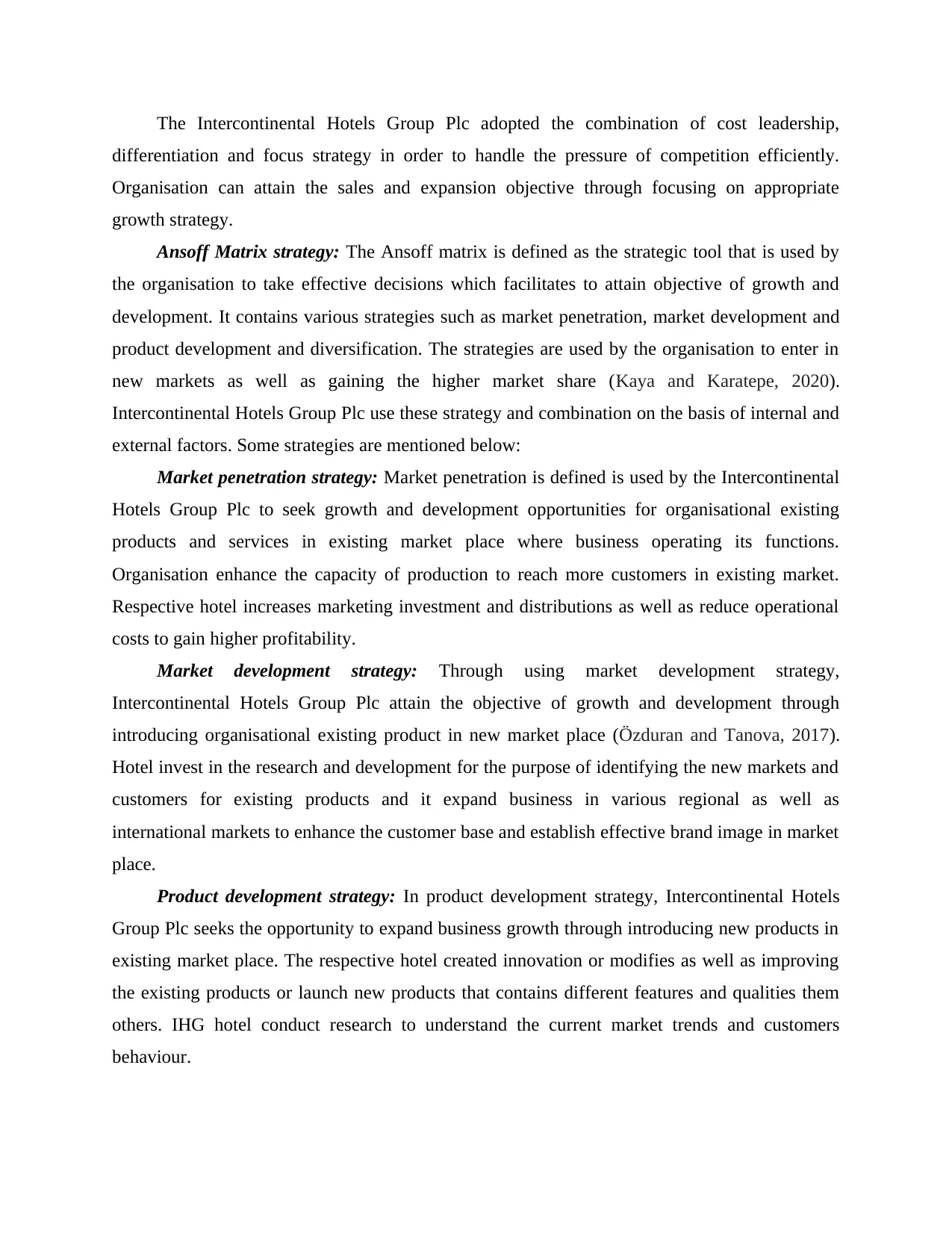
The Intercontinental Hotels Group Plc adopted the combination of cost leadership,
differentiation and focus strategy in order to handle the pressure of competition efficiently.
Organisation can attain the sales and expansion objective through focusing on appropriate
growth strategy.
Ansoff Matrix strategy: The Ansoff matrix is defined as the strategic tool that is used by
the organisation to take effective decisions which facilitates to attain objective of growth and
development. It contains various strategies such as market penetration, market development and
product development and diversification. The strategies are used by the organisation to enter in
new markets as well as gaining the higher market share (Kaya and Karatepe, 2020).
Intercontinental Hotels Group Plc use these strategy and combination on the basis of internal and
external factors. Some strategies are mentioned below:
Market penetration strategy: Market penetration is defined is used by the Intercontinental
Hotels Group Plc to seek growth and development opportunities for organisational existing
products and services in existing market place where business operating its functions.
Organisation enhance the capacity of production to reach more customers in existing market.
Respective hotel increases marketing investment and distributions as well as reduce operational
costs to gain higher profitability.
Market development strategy: Through using market development strategy,
Intercontinental Hotels Group Plc attain the objective of growth and development through
introducing organisational existing product in new market place (Özduran and Tanova, 2017).
Hotel invest in the research and development for the purpose of identifying the new markets and
customers for existing products and it expand business in various regional as well as
international markets to enhance the customer base and establish effective brand image in market
place.
Product development strategy: In product development strategy, Intercontinental Hotels
Group Plc seeks the opportunity to expand business growth through introducing new products in
existing market place. The respective hotel created innovation or modifies as well as improving
the existing products or launch new products that contains different features and qualities them
others. IHG hotel conduct research to understand the current market trends and customers
behaviour.
differentiation and focus strategy in order to handle the pressure of competition efficiently.
Organisation can attain the sales and expansion objective through focusing on appropriate
growth strategy.
Ansoff Matrix strategy: The Ansoff matrix is defined as the strategic tool that is used by
the organisation to take effective decisions which facilitates to attain objective of growth and
development. It contains various strategies such as market penetration, market development and
product development and diversification. The strategies are used by the organisation to enter in
new markets as well as gaining the higher market share (Kaya and Karatepe, 2020).
Intercontinental Hotels Group Plc use these strategy and combination on the basis of internal and
external factors. Some strategies are mentioned below:
Market penetration strategy: Market penetration is defined is used by the Intercontinental
Hotels Group Plc to seek growth and development opportunities for organisational existing
products and services in existing market place where business operating its functions.
Organisation enhance the capacity of production to reach more customers in existing market.
Respective hotel increases marketing investment and distributions as well as reduce operational
costs to gain higher profitability.
Market development strategy: Through using market development strategy,
Intercontinental Hotels Group Plc attain the objective of growth and development through
introducing organisational existing product in new market place (Özduran and Tanova, 2017).
Hotel invest in the research and development for the purpose of identifying the new markets and
customers for existing products and it expand business in various regional as well as
international markets to enhance the customer base and establish effective brand image in market
place.
Product development strategy: In product development strategy, Intercontinental Hotels
Group Plc seeks the opportunity to expand business growth through introducing new products in
existing market place. The respective hotel created innovation or modifies as well as improving
the existing products or launch new products that contains different features and qualities them
others. IHG hotel conduct research to understand the current market trends and customers
behaviour.
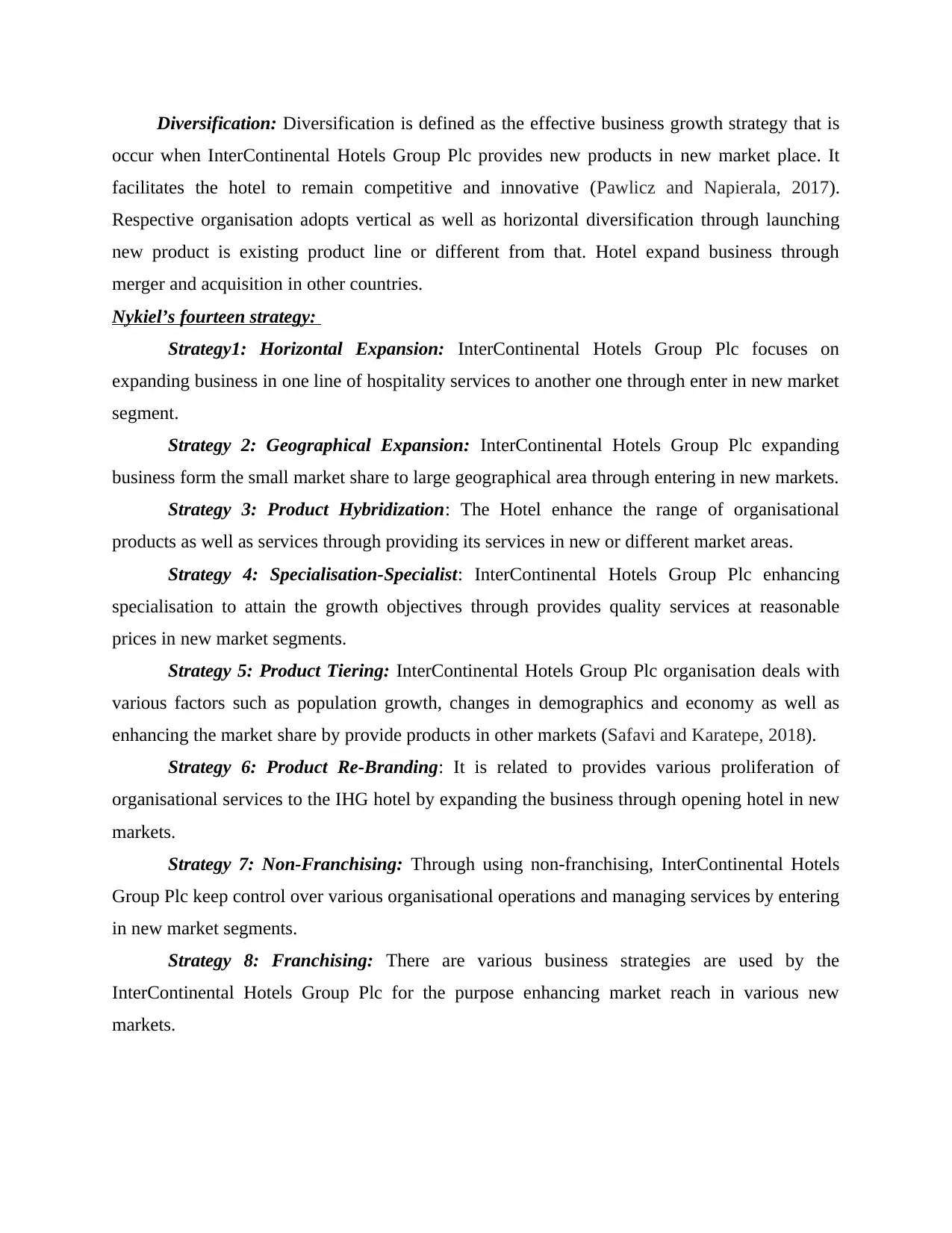
Diversification: Diversification is defined as the effective business growth strategy that is
occur when InterContinental Hotels Group Plc provides new products in new market place. It
facilitates the hotel to remain competitive and innovative (Pawlicz and Napierala, 2017).
Respective organisation adopts vertical as well as horizontal diversification through launching
new product is existing product line or different from that. Hotel expand business through
merger and acquisition in other countries.
Nykiel’s fourteen strategy:
Strategy1: Horizontal Expansion: InterContinental Hotels Group Plc focuses on
expanding business in one line of hospitality services to another one through enter in new market
segment.
Strategy 2: Geographical Expansion: InterContinental Hotels Group Plc expanding
business form the small market share to large geographical area through entering in new markets.
Strategy 3: Product Hybridization: The Hotel enhance the range of organisational
products as well as services through providing its services in new or different market areas.
Strategy 4: Specialisation-Specialist: InterContinental Hotels Group Plc enhancing
specialisation to attain the growth objectives through provides quality services at reasonable
prices in new market segments.
Strategy 5: Product Tiering: InterContinental Hotels Group Plc organisation deals with
various factors such as population growth, changes in demographics and economy as well as
enhancing the market share by provide products in other markets (Safavi and Karatepe, 2018).
Strategy 6: Product Re-Branding: It is related to provides various proliferation of
organisational services to the IHG hotel by expanding the business through opening hotel in new
markets.
Strategy 7: Non-Franchising: Through using non-franchising, InterContinental Hotels
Group Plc keep control over various organisational operations and managing services by entering
in new market segments.
Strategy 8: Franchising: There are various business strategies are used by the
InterContinental Hotels Group Plc for the purpose enhancing market reach in various new
markets.
occur when InterContinental Hotels Group Plc provides new products in new market place. It
facilitates the hotel to remain competitive and innovative (Pawlicz and Napierala, 2017).
Respective organisation adopts vertical as well as horizontal diversification through launching
new product is existing product line or different from that. Hotel expand business through
merger and acquisition in other countries.
Nykiel’s fourteen strategy:
Strategy1: Horizontal Expansion: InterContinental Hotels Group Plc focuses on
expanding business in one line of hospitality services to another one through enter in new market
segment.
Strategy 2: Geographical Expansion: InterContinental Hotels Group Plc expanding
business form the small market share to large geographical area through entering in new markets.
Strategy 3: Product Hybridization: The Hotel enhance the range of organisational
products as well as services through providing its services in new or different market areas.
Strategy 4: Specialisation-Specialist: InterContinental Hotels Group Plc enhancing
specialisation to attain the growth objectives through provides quality services at reasonable
prices in new market segments.
Strategy 5: Product Tiering: InterContinental Hotels Group Plc organisation deals with
various factors such as population growth, changes in demographics and economy as well as
enhancing the market share by provide products in other markets (Safavi and Karatepe, 2018).
Strategy 6: Product Re-Branding: It is related to provides various proliferation of
organisational services to the IHG hotel by expanding the business through opening hotel in new
markets.
Strategy 7: Non-Franchising: Through using non-franchising, InterContinental Hotels
Group Plc keep control over various organisational operations and managing services by entering
in new market segments.
Strategy 8: Franchising: There are various business strategies are used by the
InterContinental Hotels Group Plc for the purpose enhancing market reach in various new
markets.
Secure Best Marks with AI Grader
Need help grading? Try our AI Grader for instant feedback on your assignments.
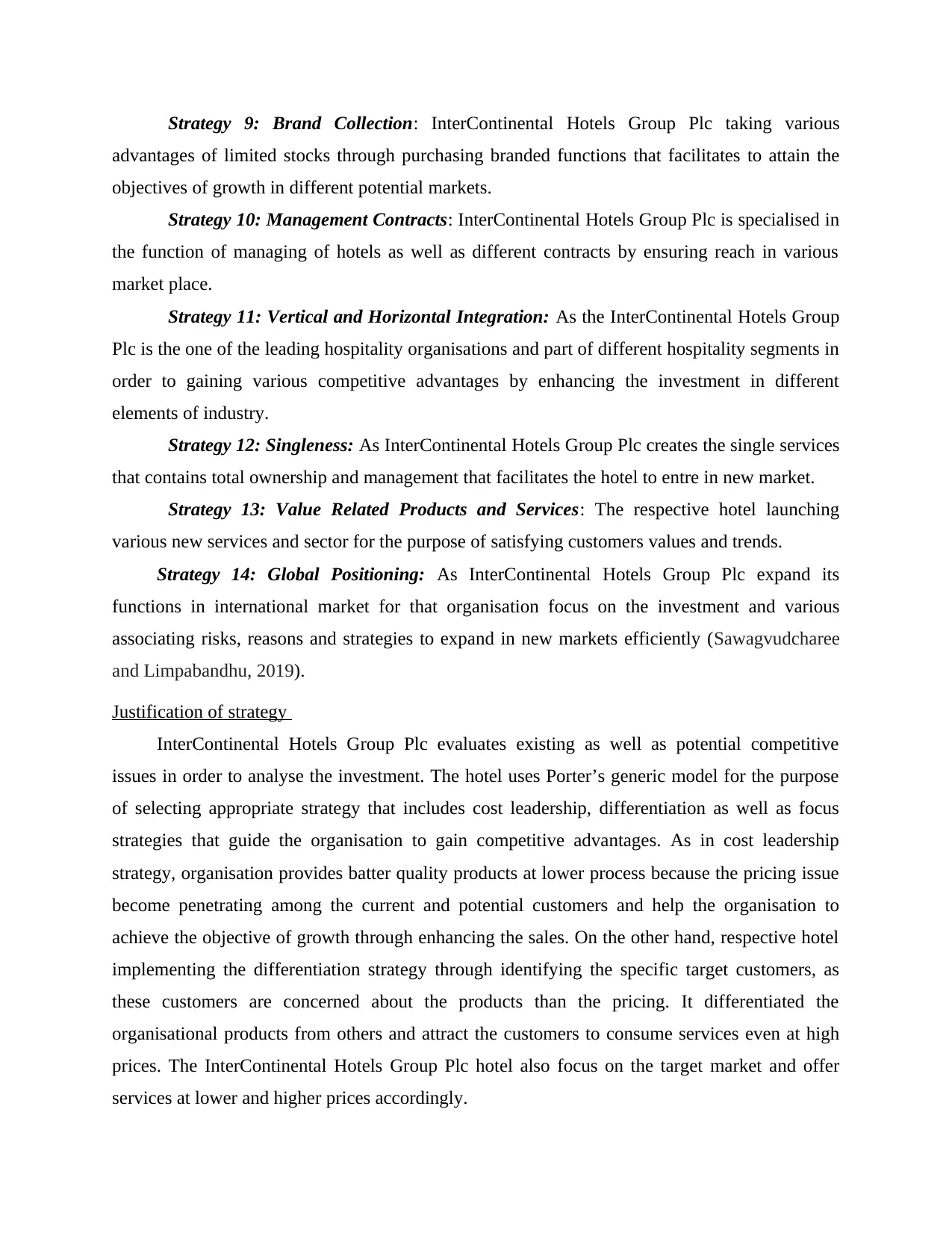
Strategy 9: Brand Collection: InterContinental Hotels Group Plc taking various
advantages of limited stocks through purchasing branded functions that facilitates to attain the
objectives of growth in different potential markets.
Strategy 10: Management Contracts: InterContinental Hotels Group Plc is specialised in
the function of managing of hotels as well as different contracts by ensuring reach in various
market place.
Strategy 11: Vertical and Horizontal Integration: As the InterContinental Hotels Group
Plc is the one of the leading hospitality organisations and part of different hospitality segments in
order to gaining various competitive advantages by enhancing the investment in different
elements of industry.
Strategy 12: Singleness: As InterContinental Hotels Group Plc creates the single services
that contains total ownership and management that facilitates the hotel to entre in new market.
Strategy 13: Value Related Products and Services: The respective hotel launching
various new services and sector for the purpose of satisfying customers values and trends.
Strategy 14: Global Positioning: As InterContinental Hotels Group Plc expand its
functions in international market for that organisation focus on the investment and various
associating risks, reasons and strategies to expand in new markets efficiently (Sawagvudcharee
and Limpabandhu, 2019).
Justification of strategy
InterContinental Hotels Group Plc evaluates existing as well as potential competitive
issues in order to analyse the investment. The hotel uses Porter’s generic model for the purpose
of selecting appropriate strategy that includes cost leadership, differentiation as well as focus
strategies that guide the organisation to gain competitive advantages. As in cost leadership
strategy, organisation provides batter quality products at lower process because the pricing issue
become penetrating among the current and potential customers and help the organisation to
achieve the objective of growth through enhancing the sales. On the other hand, respective hotel
implementing the differentiation strategy through identifying the specific target customers, as
these customers are concerned about the products than the pricing. It differentiated the
organisational products from others and attract the customers to consume services even at high
prices. The InterContinental Hotels Group Plc hotel also focus on the target market and offer
services at lower and higher prices accordingly.
advantages of limited stocks through purchasing branded functions that facilitates to attain the
objectives of growth in different potential markets.
Strategy 10: Management Contracts: InterContinental Hotels Group Plc is specialised in
the function of managing of hotels as well as different contracts by ensuring reach in various
market place.
Strategy 11: Vertical and Horizontal Integration: As the InterContinental Hotels Group
Plc is the one of the leading hospitality organisations and part of different hospitality segments in
order to gaining various competitive advantages by enhancing the investment in different
elements of industry.
Strategy 12: Singleness: As InterContinental Hotels Group Plc creates the single services
that contains total ownership and management that facilitates the hotel to entre in new market.
Strategy 13: Value Related Products and Services: The respective hotel launching
various new services and sector for the purpose of satisfying customers values and trends.
Strategy 14: Global Positioning: As InterContinental Hotels Group Plc expand its
functions in international market for that organisation focus on the investment and various
associating risks, reasons and strategies to expand in new markets efficiently (Sawagvudcharee
and Limpabandhu, 2019).
Justification of strategy
InterContinental Hotels Group Plc evaluates existing as well as potential competitive
issues in order to analyse the investment. The hotel uses Porter’s generic model for the purpose
of selecting appropriate strategy that includes cost leadership, differentiation as well as focus
strategies that guide the organisation to gain competitive advantages. As in cost leadership
strategy, organisation provides batter quality products at lower process because the pricing issue
become penetrating among the current and potential customers and help the organisation to
achieve the objective of growth through enhancing the sales. On the other hand, respective hotel
implementing the differentiation strategy through identifying the specific target customers, as
these customers are concerned about the products than the pricing. It differentiated the
organisational products from others and attract the customers to consume services even at high
prices. The InterContinental Hotels Group Plc hotel also focus on the target market and offer
services at lower and higher prices accordingly.
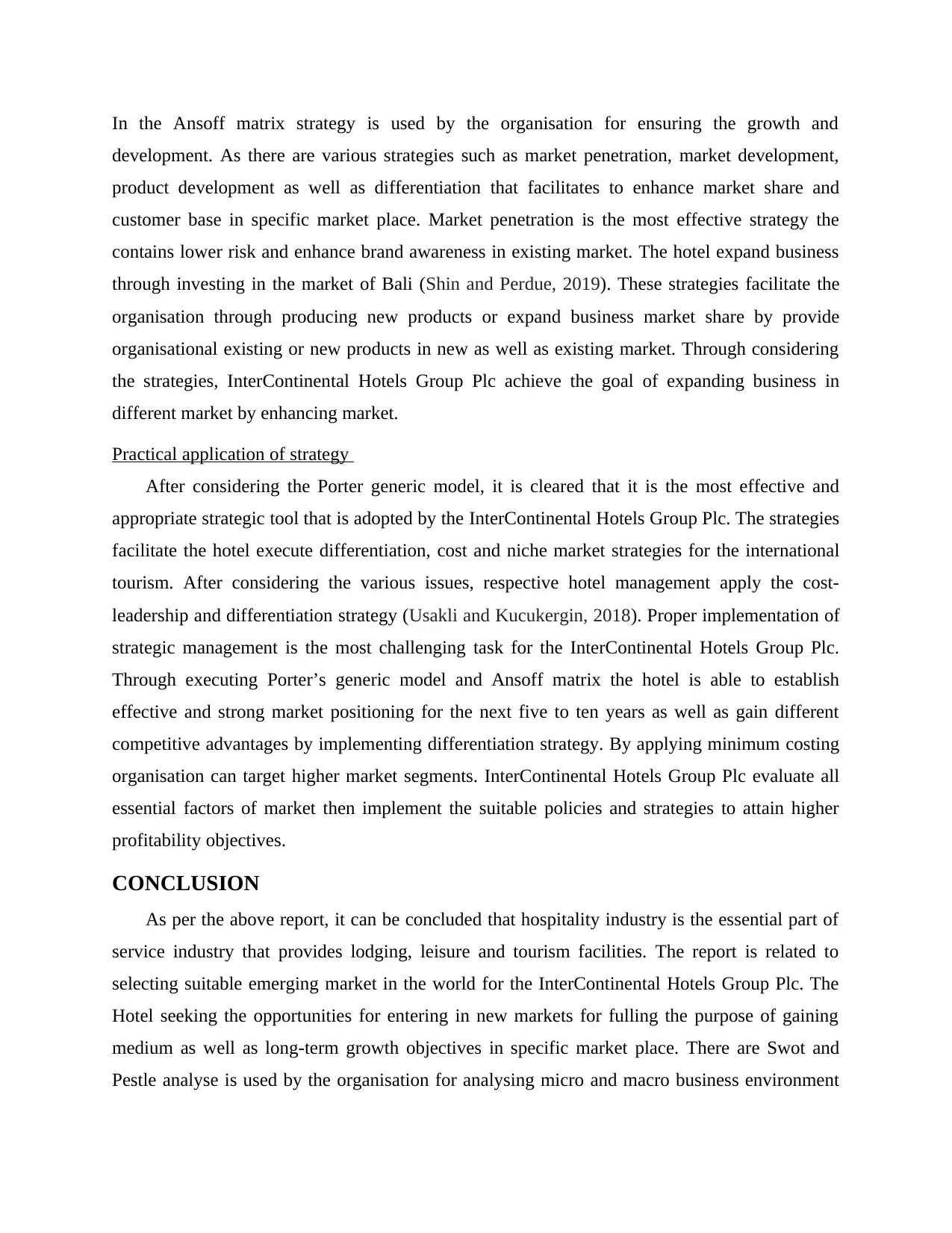
In the Ansoff matrix strategy is used by the organisation for ensuring the growth and
development. As there are various strategies such as market penetration, market development,
product development as well as differentiation that facilitates to enhance market share and
customer base in specific market place. Market penetration is the most effective strategy the
contains lower risk and enhance brand awareness in existing market. The hotel expand business
through investing in the market of Bali (Shin and Perdue, 2019). These strategies facilitate the
organisation through producing new products or expand business market share by provide
organisational existing or new products in new as well as existing market. Through considering
the strategies, InterContinental Hotels Group Plc achieve the goal of expanding business in
different market by enhancing market.
Practical application of strategy
After considering the Porter generic model, it is cleared that it is the most effective and
appropriate strategic tool that is adopted by the InterContinental Hotels Group Plc. The strategies
facilitate the hotel execute differentiation, cost and niche market strategies for the international
tourism. After considering the various issues, respective hotel management apply the cost-
leadership and differentiation strategy (Usakli and Kucukergin, 2018). Proper implementation of
strategic management is the most challenging task for the InterContinental Hotels Group Plc.
Through executing Porter’s generic model and Ansoff matrix the hotel is able to establish
effective and strong market positioning for the next five to ten years as well as gain different
competitive advantages by implementing differentiation strategy. By applying minimum costing
organisation can target higher market segments. InterContinental Hotels Group Plc evaluate all
essential factors of market then implement the suitable policies and strategies to attain higher
profitability objectives.
CONCLUSION
As per the above report, it can be concluded that hospitality industry is the essential part of
service industry that provides lodging, leisure and tourism facilities. The report is related to
selecting suitable emerging market in the world for the InterContinental Hotels Group Plc. The
Hotel seeking the opportunities for entering in new markets for fulling the purpose of gaining
medium as well as long-term growth objectives in specific market place. There are Swot and
Pestle analyse is used by the organisation for analysing micro and macro business environment
development. As there are various strategies such as market penetration, market development,
product development as well as differentiation that facilitates to enhance market share and
customer base in specific market place. Market penetration is the most effective strategy the
contains lower risk and enhance brand awareness in existing market. The hotel expand business
through investing in the market of Bali (Shin and Perdue, 2019). These strategies facilitate the
organisation through producing new products or expand business market share by provide
organisational existing or new products in new as well as existing market. Through considering
the strategies, InterContinental Hotels Group Plc achieve the goal of expanding business in
different market by enhancing market.
Practical application of strategy
After considering the Porter generic model, it is cleared that it is the most effective and
appropriate strategic tool that is adopted by the InterContinental Hotels Group Plc. The strategies
facilitate the hotel execute differentiation, cost and niche market strategies for the international
tourism. After considering the various issues, respective hotel management apply the cost-
leadership and differentiation strategy (Usakli and Kucukergin, 2018). Proper implementation of
strategic management is the most challenging task for the InterContinental Hotels Group Plc.
Through executing Porter’s generic model and Ansoff matrix the hotel is able to establish
effective and strong market positioning for the next five to ten years as well as gain different
competitive advantages by implementing differentiation strategy. By applying minimum costing
organisation can target higher market segments. InterContinental Hotels Group Plc evaluate all
essential factors of market then implement the suitable policies and strategies to attain higher
profitability objectives.
CONCLUSION
As per the above report, it can be concluded that hospitality industry is the essential part of
service industry that provides lodging, leisure and tourism facilities. The report is related to
selecting suitable emerging market in the world for the InterContinental Hotels Group Plc. The
Hotel seeking the opportunities for entering in new markets for fulling the purpose of gaining
medium as well as long-term growth objectives in specific market place. There are Swot and
Pestle analyse is used by the organisation for analysing micro and macro business environment
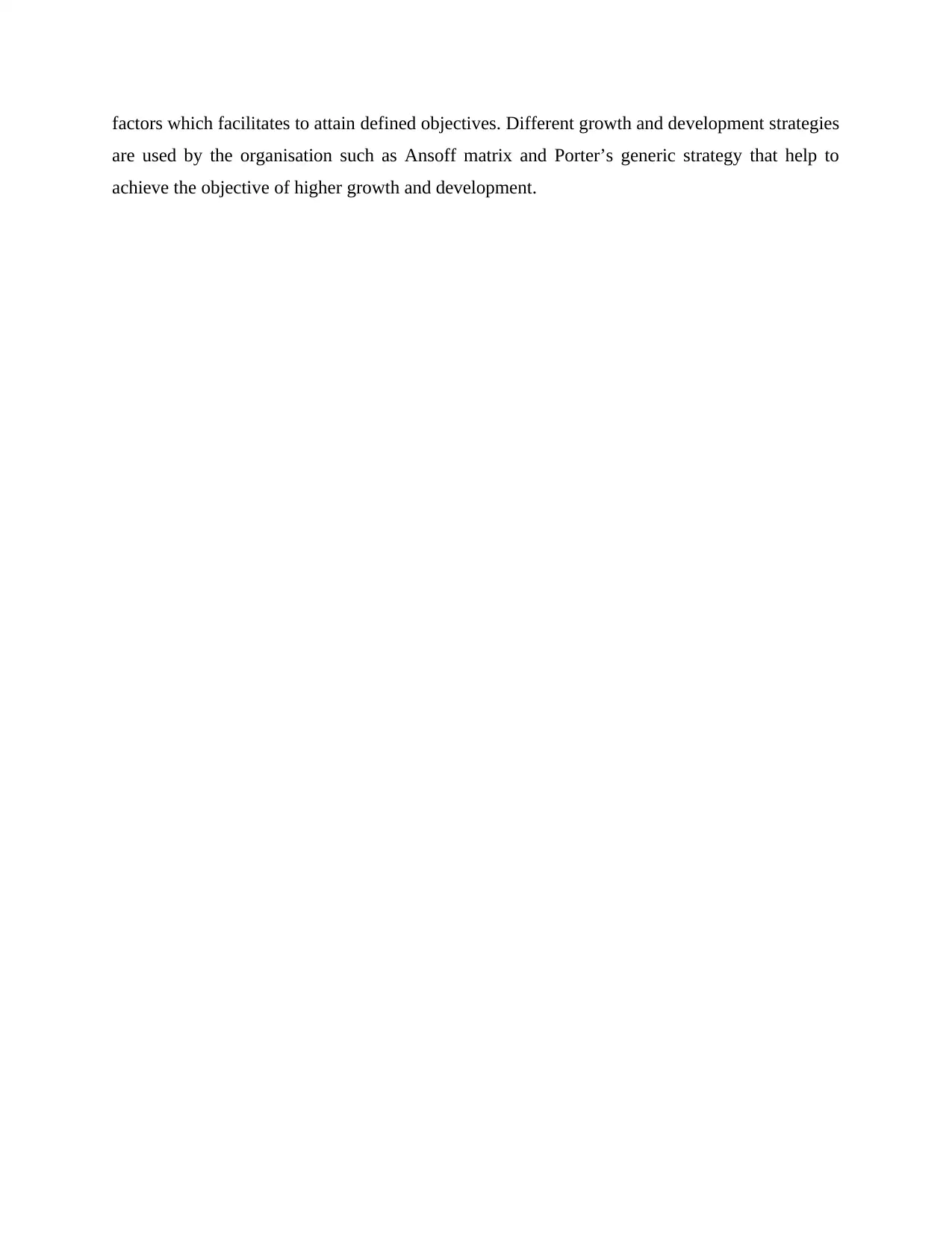
factors which facilitates to attain defined objectives. Different growth and development strategies
are used by the organisation such as Ansoff matrix and Porter’s generic strategy that help to
achieve the objective of higher growth and development.
are used by the organisation such as Ansoff matrix and Porter’s generic strategy that help to
achieve the objective of higher growth and development.
Paraphrase This Document
Need a fresh take? Get an instant paraphrase of this document with our AI Paraphraser
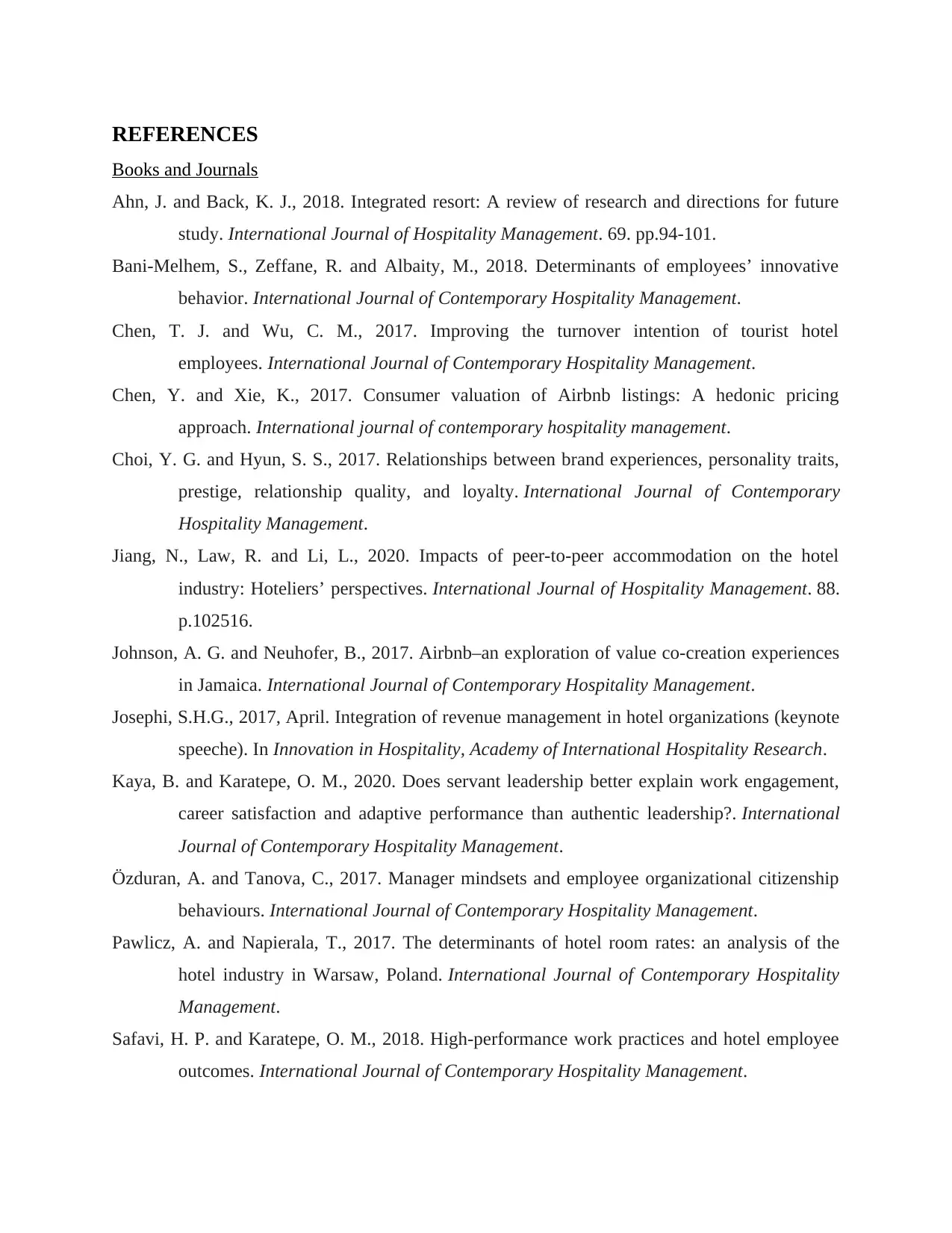
REFERENCES
Books and Journals
Ahn, J. and Back, K. J., 2018. Integrated resort: A review of research and directions for future
study. International Journal of Hospitality Management. 69. pp.94-101.
Bani-Melhem, S., Zeffane, R. and Albaity, M., 2018. Determinants of employees’ innovative
behavior. International Journal of Contemporary Hospitality Management.
Chen, T. J. and Wu, C. M., 2017. Improving the turnover intention of tourist hotel
employees. International Journal of Contemporary Hospitality Management.
Chen, Y. and Xie, K., 2017. Consumer valuation of Airbnb listings: A hedonic pricing
approach. International journal of contemporary hospitality management.
Choi, Y. G. and Hyun, S. S., 2017. Relationships between brand experiences, personality traits,
prestige, relationship quality, and loyalty. International Journal of Contemporary
Hospitality Management.
Jiang, N., Law, R. and Li, L., 2020. Impacts of peer-to-peer accommodation on the hotel
industry: Hoteliers’ perspectives. International Journal of Hospitality Management. 88.
p.102516.
Johnson, A. G. and Neuhofer, B., 2017. Airbnb–an exploration of value co-creation experiences
in Jamaica. International Journal of Contemporary Hospitality Management.
Josephi, S.H.G., 2017, April. Integration of revenue management in hotel organizations (keynote
speeche). In Innovation in Hospitality, Academy of International Hospitality Research.
Kaya, B. and Karatepe, O. M., 2020. Does servant leadership better explain work engagement,
career satisfaction and adaptive performance than authentic leadership?. International
Journal of Contemporary Hospitality Management.
Özduran, A. and Tanova, C., 2017. Manager mindsets and employee organizational citizenship
behaviours. International Journal of Contemporary Hospitality Management.
Pawlicz, A. and Napierala, T., 2017. The determinants of hotel room rates: an analysis of the
hotel industry in Warsaw, Poland. International Journal of Contemporary Hospitality
Management.
Safavi, H. P. and Karatepe, O. M., 2018. High-performance work practices and hotel employee
outcomes. International Journal of Contemporary Hospitality Management.
Books and Journals
Ahn, J. and Back, K. J., 2018. Integrated resort: A review of research and directions for future
study. International Journal of Hospitality Management. 69. pp.94-101.
Bani-Melhem, S., Zeffane, R. and Albaity, M., 2018. Determinants of employees’ innovative
behavior. International Journal of Contemporary Hospitality Management.
Chen, T. J. and Wu, C. M., 2017. Improving the turnover intention of tourist hotel
employees. International Journal of Contemporary Hospitality Management.
Chen, Y. and Xie, K., 2017. Consumer valuation of Airbnb listings: A hedonic pricing
approach. International journal of contemporary hospitality management.
Choi, Y. G. and Hyun, S. S., 2017. Relationships between brand experiences, personality traits,
prestige, relationship quality, and loyalty. International Journal of Contemporary
Hospitality Management.
Jiang, N., Law, R. and Li, L., 2020. Impacts of peer-to-peer accommodation on the hotel
industry: Hoteliers’ perspectives. International Journal of Hospitality Management. 88.
p.102516.
Johnson, A. G. and Neuhofer, B., 2017. Airbnb–an exploration of value co-creation experiences
in Jamaica. International Journal of Contemporary Hospitality Management.
Josephi, S.H.G., 2017, April. Integration of revenue management in hotel organizations (keynote
speeche). In Innovation in Hospitality, Academy of International Hospitality Research.
Kaya, B. and Karatepe, O. M., 2020. Does servant leadership better explain work engagement,
career satisfaction and adaptive performance than authentic leadership?. International
Journal of Contemporary Hospitality Management.
Özduran, A. and Tanova, C., 2017. Manager mindsets and employee organizational citizenship
behaviours. International Journal of Contemporary Hospitality Management.
Pawlicz, A. and Napierala, T., 2017. The determinants of hotel room rates: an analysis of the
hotel industry in Warsaw, Poland. International Journal of Contemporary Hospitality
Management.
Safavi, H. P. and Karatepe, O. M., 2018. High-performance work practices and hotel employee
outcomes. International Journal of Contemporary Hospitality Management.
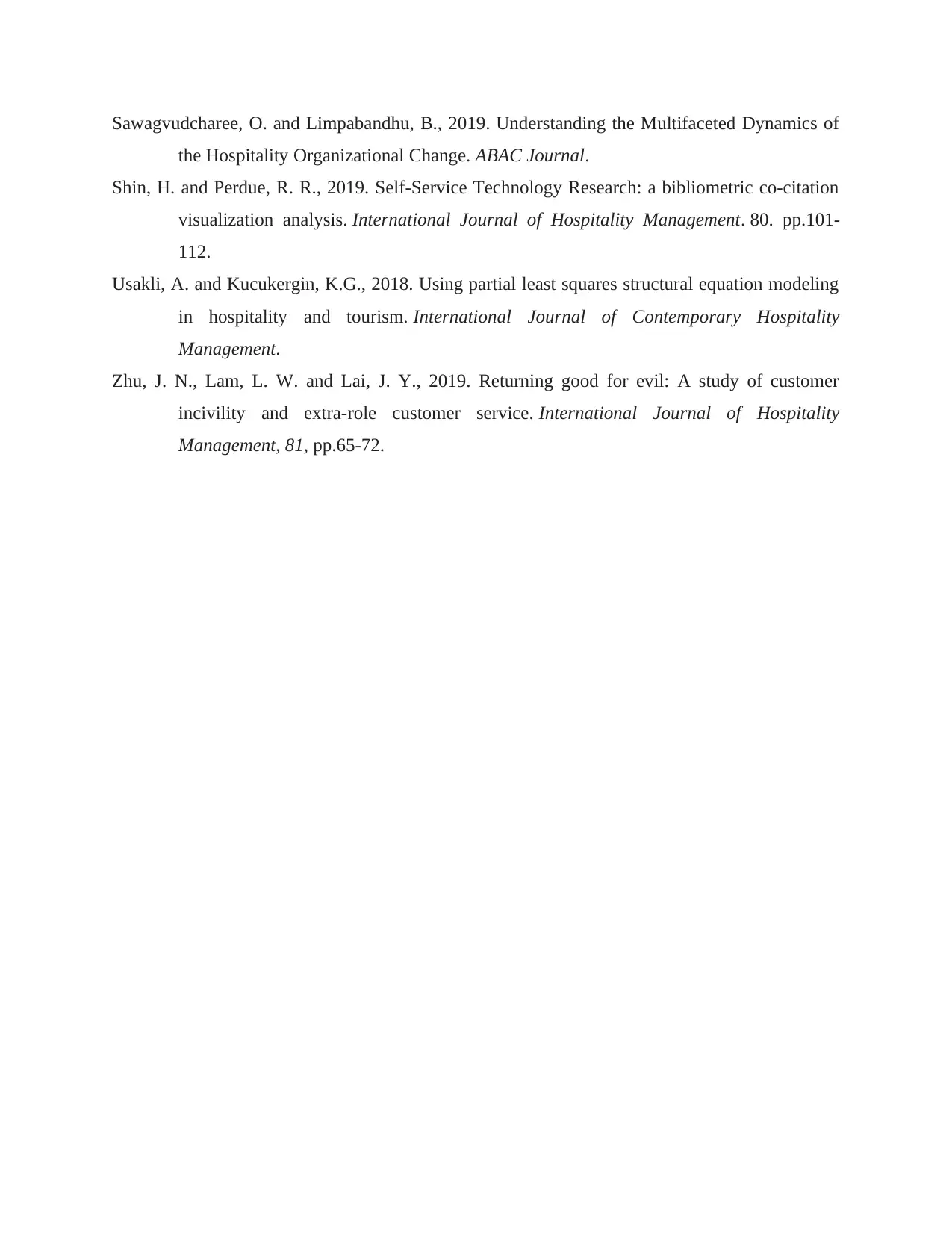
Sawagvudcharee, O. and Limpabandhu, B., 2019. Understanding the Multifaceted Dynamics of
the Hospitality Organizational Change. ABAC Journal.
Shin, H. and Perdue, R. R., 2019. Self-Service Technology Research: a bibliometric co-citation
visualization analysis. International Journal of Hospitality Management. 80. pp.101-
112.
Usakli, A. and Kucukergin, K.G., 2018. Using partial least squares structural equation modeling
in hospitality and tourism. International Journal of Contemporary Hospitality
Management.
Zhu, J. N., Lam, L. W. and Lai, J. Y., 2019. Returning good for evil: A study of customer
incivility and extra-role customer service. International Journal of Hospitality
Management, 81, pp.65-72.
the Hospitality Organizational Change. ABAC Journal.
Shin, H. and Perdue, R. R., 2019. Self-Service Technology Research: a bibliometric co-citation
visualization analysis. International Journal of Hospitality Management. 80. pp.101-
112.
Usakli, A. and Kucukergin, K.G., 2018. Using partial least squares structural equation modeling
in hospitality and tourism. International Journal of Contemporary Hospitality
Management.
Zhu, J. N., Lam, L. W. and Lai, J. Y., 2019. Returning good for evil: A study of customer
incivility and extra-role customer service. International Journal of Hospitality
Management, 81, pp.65-72.

1 out of 16
Related Documents
Your All-in-One AI-Powered Toolkit for Academic Success.
+13062052269
info@desklib.com
Available 24*7 on WhatsApp / Email
![[object Object]](/_next/static/media/star-bottom.7253800d.svg)
Unlock your academic potential
© 2024 | Zucol Services PVT LTD | All rights reserved.




